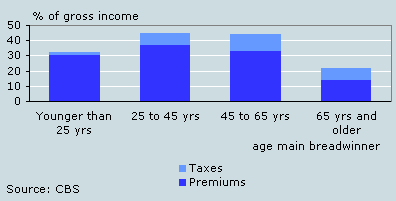Average income Dutch household approximately 50 thousand euro

In 2005, the average gross income of a Dutch household was approximately 50 thousand euro. More than one fifth consisted of receipts from the government. The amount paid in premiums and taxes, over 40 percent of the household income, was almost twice as high.
Income age-related
Gross household incomes vary widely and also depend on the age of the main breadwinner. With 17.3 thousand euro, young households (under the age of 25) had the lowest gross incomes. Main breadwinners aged between 45 and 65 accounted for the highest household incomes averaging 62.3 thousand euro. This is more than twice the gross income of over-65 households.
Gross income, 2005*

Benefits make up more than 80 percent of incomes over-65s
There are also obvious income discrepancies between the benefits received by the various age groups; 81 percent of the incomes of over-65s consisted of benefits, predominantly old age and retirement pensions.
A relatively large proportion of the gross income of young people, too, consisted of benefits, mostly provided by the government, e.g. student grants and income support benefits.
Benefits, 2005*

Older households pay more taxes
Households in the 25-64 age category paid more than 44 percent of their gross income in taxes and social contributions in 2005. In relative terms, older households (main breadwinner aged 45–64) paid more taxes, younger households ((aged 25-44) paid more social contributions.
Main breadwinners over the age of 65 paid only 22 percent of their gross income in taxes and social contributions.
Social contributions and taxes, 2005*

Linda Moonen